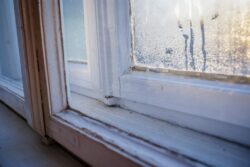People could be unwittingly spreading damp and mould (Picture: Getty Images)
As the cost of living crisis continues to hit families across the UK, a leading academic has urged people to take steps to protect their health.
While it may seem tempting to switch the heating off, close windows and use log burners to keep in heat – this seemingly cost-saving hack poses a danger.
Doing so can lead to making people more vulnerable to health risks and accelerate infection spread.
Cath Noakes, professor of environmental engineering for buildings at Leeds University, said there is currently a ‘massive conundrum’ where people are taking steps to reduce energy use but consequently reducing ventilation and adding new pollutants into the indoor air by burning wood or cooking.
She said: ‘I have a real concern that some of the things people are doing actually have a compounding effect.
‘So if you are at home, for example, and you don’t turn the heating on and you keep the window shut, not only have you reduced ventilation, but you’ve also created a condition where you might get more damp and mould, which has a knock-on effect of impacting your health.’
Prof Noakes was one of the advisers on the Government’s Scientific Advisory Group for Emergencies (Sage) during the pandemic.
Previous research by her team showed that being in a room with fresh air can reduce the risk of Covid-19 infection from airborne droplets by more than 70% – as fresh air dilutes the particles containing coronavirus.
Turning off the heating and closing windows leads to a ‘knock-on affect’ for our health, said Prof Noakes (Picture: Getty Images/iStockphoto)
Prof Noakes says the importance of managing ventilation in homes and other indoor spaces goes beyond Covid.
There is evidence that other infections like chicken pox, measles, TB, and other respiratory diseases such as influenza, can also pose a higher risk in poorly ventilated spaces.
‘We breathe about 14,000 litres of air every day’, she added.
‘A lot of what we’re exposed to comes from what we breathe.
‘Around 90% of the time we’re indoors – that might be your home, workplace, schools, transport and social settings.
Families across the UK are making huge changes amid a rise in the cost of living (Picture: Vuk Valcic/SOPA Images/Shutterstock)
‘There is so much evidence that the quality of the air we breathe is really important for our health – and ventilation is a really big part of that.’
Prof Noakes said there are many ways in which ventilation can be improved at low or minimal cost – such as ensuring good maintenance of systems and raising awareness of the importance of ventilation.
She said: ‘(When) you open windows intermittently, you can get some of that fresh air in without actually having a significant impact on your energy use.
‘Making sure you open a window after you’ve had a shower or using an extractor fan in your kitchen when you cook can also help.
‘You’re only using it for short periods of time – so you’re not using much energy to provide ventilation.’
Where improving ventilation is difficult, using air cleaning devices can be a low-energy way of improving indoor air quality, she added.
Better ventilation in workplaces and schools is also associated with lower illness absence, Prof Noakes said.
Along with an international team of scientists, Prof Noakes is spearheading a campaign – called World Ventil8 Day, which takes place on November 8 – to raise more awareness of the role building ventilation plays in supporting the health and wellbeing of people.
More information can be found here
Get in touch with our news team by emailing us at [email protected].
For more stories like this, check our news page.
There is evidence infections like chicken pox, measles and TB can pose a higher risk in poorly ventilated spaces.





